Sleep Loss: Hypothesis, Research Papers, and Comparative Analysis
VerifiedAdded on 2019/11/08
|11
|2941
|481
Essay
AI Summary
This essay examines the effects of sleep deprivation on cognitive functions, focusing on two key hypotheses: sustained attention performance instability and prefrontal neuropsychological effects. The first hypothesis, proposed by Doran, Dongen, and Dinges, suggests that sleep deprivation causes instability in alertness, affecting neurobehavioral performance but not eliminating it entirely. The second hypothesis, concerning prefrontal neuropsychological effects, posits that sleep deprivation in young adults impairs the prefrontal cortex similarly to the effects of healthy aging. The essay compares these hypotheses and analyzes six research papers, including studies by Drummond et al., Chee et al., and Chee & Choo, to assess their validity. The analysis reveals that task difficulty can facilitate cerebral compensatory responses, and that lapses during sleep deprivation are associated with reduced brain activity in frontal and parietal regions. The essay concludes that while sleep deprivation affects cognitive performance, the brain attempts to compensate, highlighting the complex interplay between sleep loss, brain function, and cognitive outcomes.
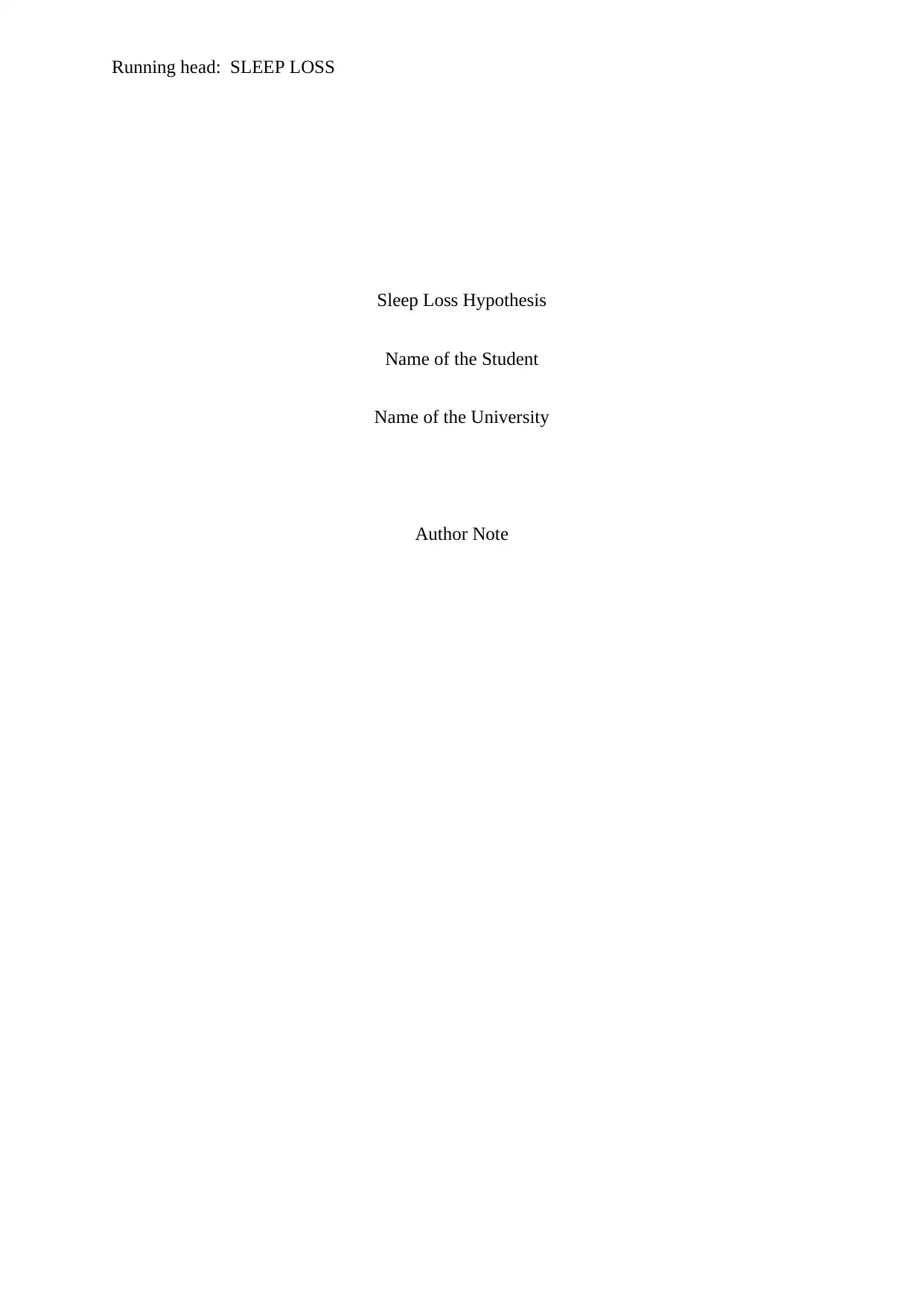
Running head: SLEEP LOSS
Sleep Loss Hypothesis
Name of the Student
Name of the University
Author Note
Sleep Loss Hypothesis
Name of the Student
Name of the University
Author Note
Paraphrase This Document
Need a fresh take? Get an instant paraphrase of this document with our AI Paraphraser
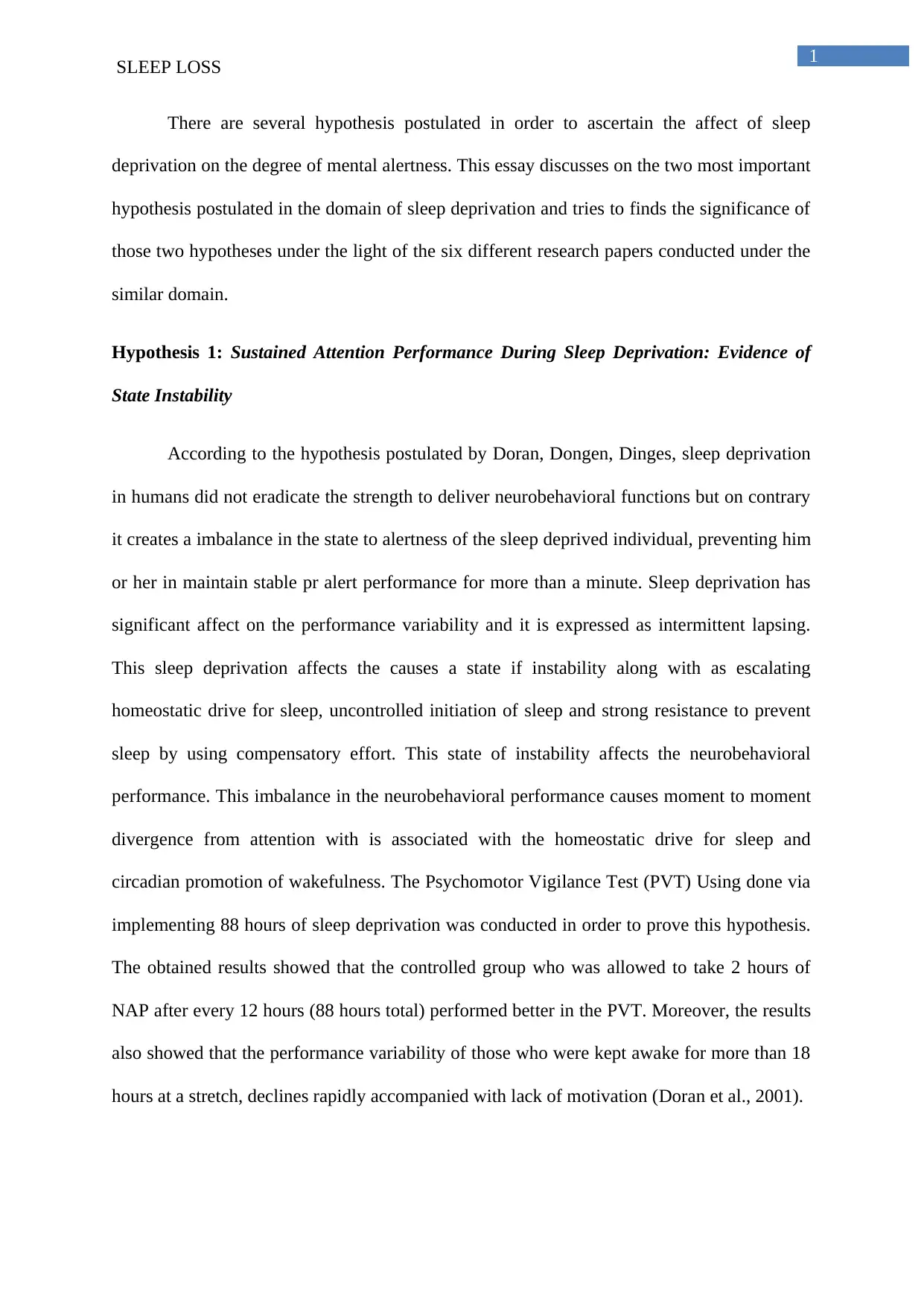
1
SLEEP LOSS
There are several hypothesis postulated in order to ascertain the affect of sleep
deprivation on the degree of mental alertness. This essay discusses on the two most important
hypothesis postulated in the domain of sleep deprivation and tries to finds the significance of
those two hypotheses under the light of the six different research papers conducted under the
similar domain.
Hypothesis 1: Sustained Attention Performance During Sleep Deprivation: Evidence of
State Instability
According to the hypothesis postulated by Doran, Dongen, Dinges, sleep deprivation
in humans did not eradicate the strength to deliver neurobehavioral functions but on contrary
it creates a imbalance in the state to alertness of the sleep deprived individual, preventing him
or her in maintain stable pr alert performance for more than a minute. Sleep deprivation has
significant affect on the performance variability and it is expressed as intermittent lapsing.
This sleep deprivation affects the causes a state if instability along with as escalating
homeostatic drive for sleep, uncontrolled initiation of sleep and strong resistance to prevent
sleep by using compensatory effort. This state of instability affects the neurobehavioral
performance. This imbalance in the neurobehavioral performance causes moment to moment
divergence from attention with is associated with the homeostatic drive for sleep and
circadian promotion of wakefulness. The Psychomotor Vigilance Test (PVT) Using done via
implementing 88 hours of sleep deprivation was conducted in order to prove this hypothesis.
The obtained results showed that the controlled group who was allowed to take 2 hours of
NAP after every 12 hours (88 hours total) performed better in the PVT. Moreover, the results
also showed that the performance variability of those who were kept awake for more than 18
hours at a stretch, declines rapidly accompanied with lack of motivation (Doran et al., 2001).
SLEEP LOSS
There are several hypothesis postulated in order to ascertain the affect of sleep
deprivation on the degree of mental alertness. This essay discusses on the two most important
hypothesis postulated in the domain of sleep deprivation and tries to finds the significance of
those two hypotheses under the light of the six different research papers conducted under the
similar domain.
Hypothesis 1: Sustained Attention Performance During Sleep Deprivation: Evidence of
State Instability
According to the hypothesis postulated by Doran, Dongen, Dinges, sleep deprivation
in humans did not eradicate the strength to deliver neurobehavioral functions but on contrary
it creates a imbalance in the state to alertness of the sleep deprived individual, preventing him
or her in maintain stable pr alert performance for more than a minute. Sleep deprivation has
significant affect on the performance variability and it is expressed as intermittent lapsing.
This sleep deprivation affects the causes a state if instability along with as escalating
homeostatic drive for sleep, uncontrolled initiation of sleep and strong resistance to prevent
sleep by using compensatory effort. This state of instability affects the neurobehavioral
performance. This imbalance in the neurobehavioral performance causes moment to moment
divergence from attention with is associated with the homeostatic drive for sleep and
circadian promotion of wakefulness. The Psychomotor Vigilance Test (PVT) Using done via
implementing 88 hours of sleep deprivation was conducted in order to prove this hypothesis.
The obtained results showed that the controlled group who was allowed to take 2 hours of
NAP after every 12 hours (88 hours total) performed better in the PVT. Moreover, the results
also showed that the performance variability of those who were kept awake for more than 18
hours at a stretch, declines rapidly accompanied with lack of motivation (Doran et al., 2001).
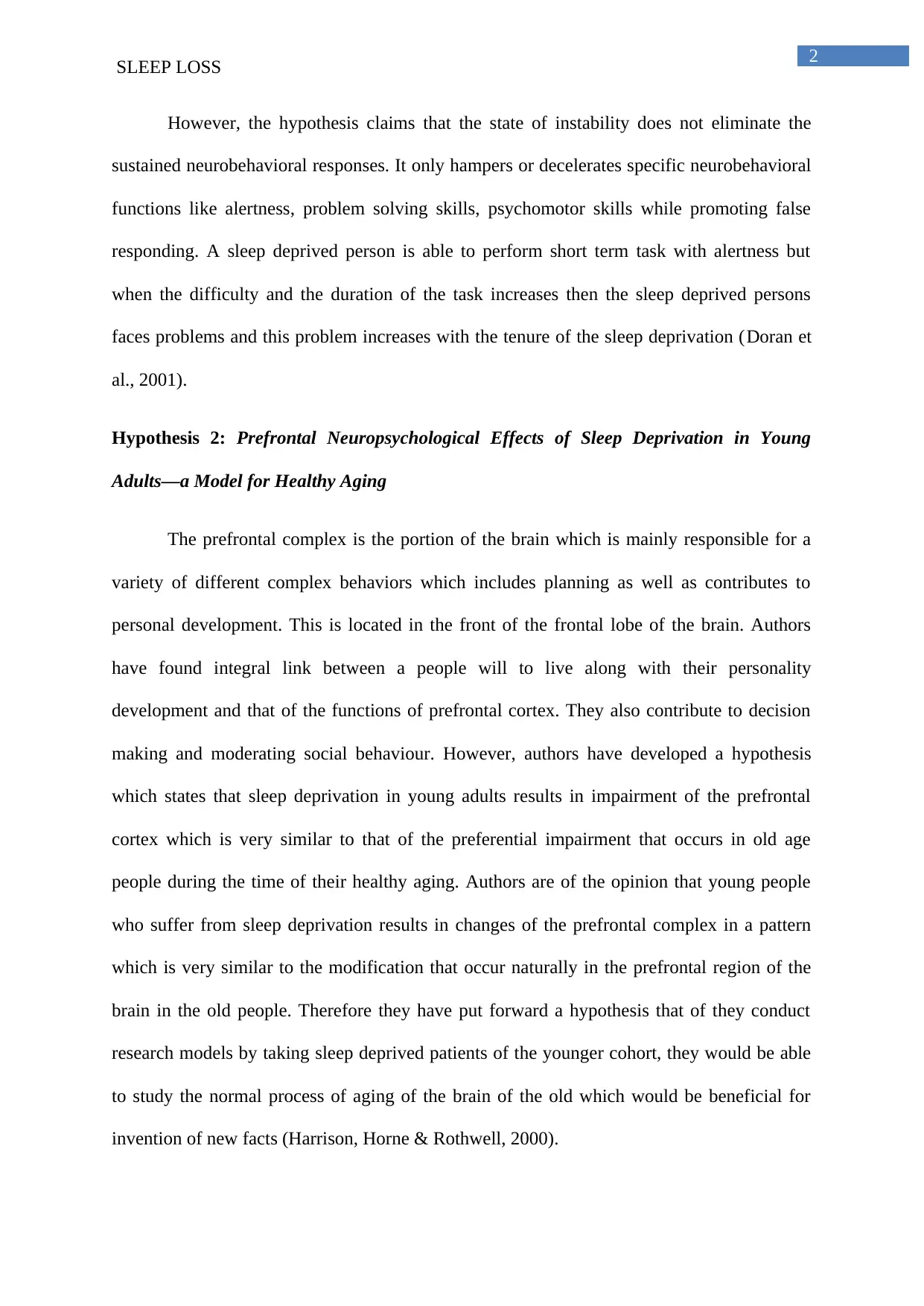
2
SLEEP LOSS
However, the hypothesis claims that the state of instability does not eliminate the
sustained neurobehavioral responses. It only hampers or decelerates specific neurobehavioral
functions like alertness, problem solving skills, psychomotor skills while promoting false
responding. A sleep deprived person is able to perform short term task with alertness but
when the difficulty and the duration of the task increases then the sleep deprived persons
faces problems and this problem increases with the tenure of the sleep deprivation (Doran et
al., 2001).
Hypothesis 2: Prefrontal Neuropsychological Effects of Sleep Deprivation in Young
Adults—a Model for Healthy Aging
The prefrontal complex is the portion of the brain which is mainly responsible for a
variety of different complex behaviors which includes planning as well as contributes to
personal development. This is located in the front of the frontal lobe of the brain. Authors
have found integral link between a people will to live along with their personality
development and that of the functions of prefrontal cortex. They also contribute to decision
making and moderating social behaviour. However, authors have developed a hypothesis
which states that sleep deprivation in young adults results in impairment of the prefrontal
cortex which is very similar to that of the preferential impairment that occurs in old age
people during the time of their healthy aging. Authors are of the opinion that young people
who suffer from sleep deprivation results in changes of the prefrontal complex in a pattern
which is very similar to the modification that occur naturally in the prefrontal region of the
brain in the old people. Therefore they have put forward a hypothesis that of they conduct
research models by taking sleep deprived patients of the younger cohort, they would be able
to study the normal process of aging of the brain of the old which would be beneficial for
invention of new facts (Harrison, Horne & Rothwell, 2000).
SLEEP LOSS
However, the hypothesis claims that the state of instability does not eliminate the
sustained neurobehavioral responses. It only hampers or decelerates specific neurobehavioral
functions like alertness, problem solving skills, psychomotor skills while promoting false
responding. A sleep deprived person is able to perform short term task with alertness but
when the difficulty and the duration of the task increases then the sleep deprived persons
faces problems and this problem increases with the tenure of the sleep deprivation (Doran et
al., 2001).
Hypothesis 2: Prefrontal Neuropsychological Effects of Sleep Deprivation in Young
Adults—a Model for Healthy Aging
The prefrontal complex is the portion of the brain which is mainly responsible for a
variety of different complex behaviors which includes planning as well as contributes to
personal development. This is located in the front of the frontal lobe of the brain. Authors
have found integral link between a people will to live along with their personality
development and that of the functions of prefrontal cortex. They also contribute to decision
making and moderating social behaviour. However, authors have developed a hypothesis
which states that sleep deprivation in young adults results in impairment of the prefrontal
cortex which is very similar to that of the preferential impairment that occurs in old age
people during the time of their healthy aging. Authors are of the opinion that young people
who suffer from sleep deprivation results in changes of the prefrontal complex in a pattern
which is very similar to the modification that occur naturally in the prefrontal region of the
brain in the old people. Therefore they have put forward a hypothesis that of they conduct
research models by taking sleep deprived patients of the younger cohort, they would be able
to study the normal process of aging of the brain of the old which would be beneficial for
invention of new facts (Harrison, Horne & Rothwell, 2000).
⊘ This is a preview!⊘
Do you want full access?
Subscribe today to unlock all pages.

Trusted by 1+ million students worldwide
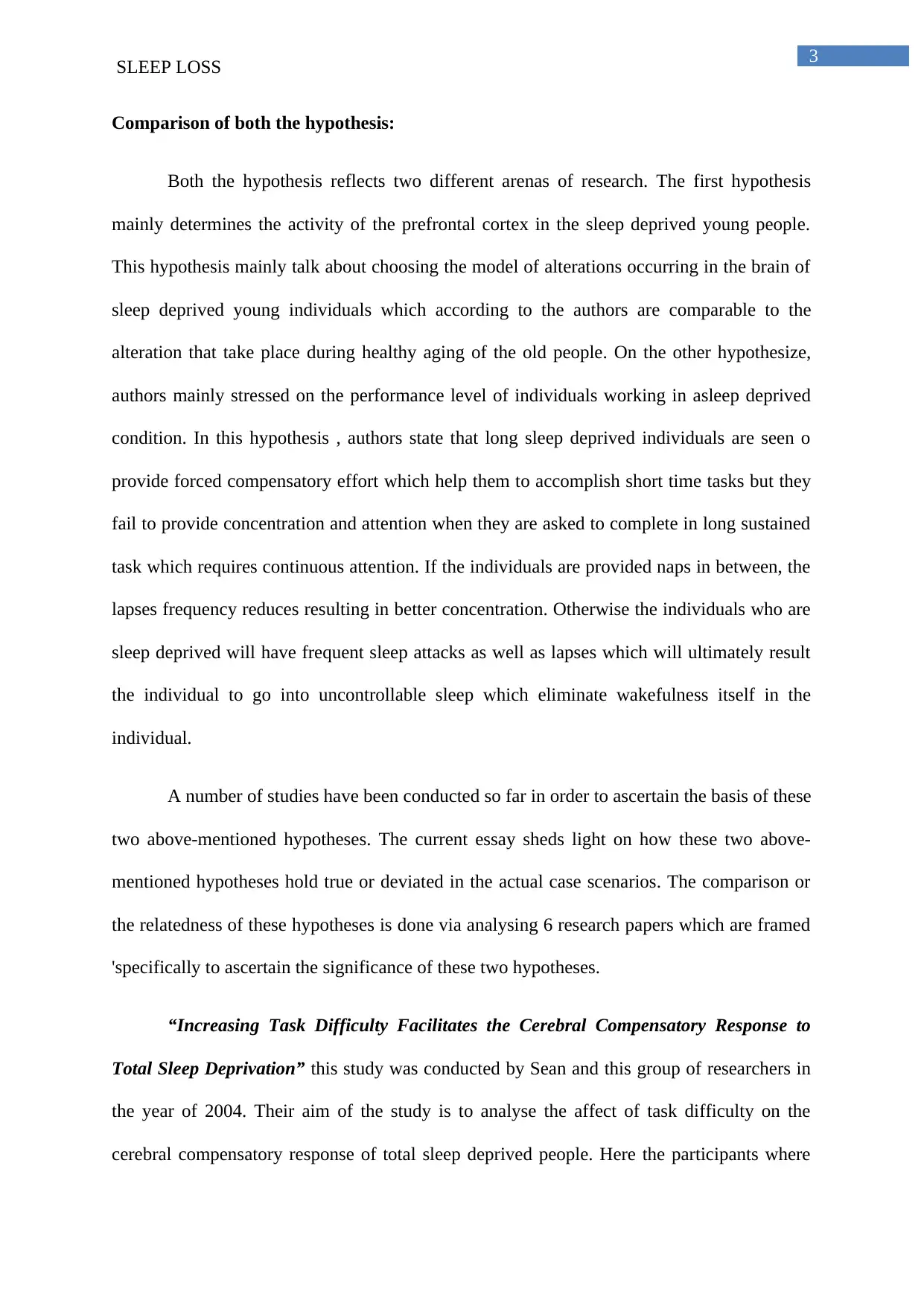
3
SLEEP LOSS
Comparison of both the hypothesis:
Both the hypothesis reflects two different arenas of research. The first hypothesis
mainly determines the activity of the prefrontal cortex in the sleep deprived young people.
This hypothesis mainly talk about choosing the model of alterations occurring in the brain of
sleep deprived young individuals which according to the authors are comparable to the
alteration that take place during healthy aging of the old people. On the other hypothesize,
authors mainly stressed on the performance level of individuals working in asleep deprived
condition. In this hypothesis , authors state that long sleep deprived individuals are seen o
provide forced compensatory effort which help them to accomplish short time tasks but they
fail to provide concentration and attention when they are asked to complete in long sustained
task which requires continuous attention. If the individuals are provided naps in between, the
lapses frequency reduces resulting in better concentration. Otherwise the individuals who are
sleep deprived will have frequent sleep attacks as well as lapses which will ultimately result
the individual to go into uncontrollable sleep which eliminate wakefulness itself in the
individual.
A number of studies have been conducted so far in order to ascertain the basis of these
two above-mentioned hypotheses. The current essay sheds light on how these two above-
mentioned hypotheses hold true or deviated in the actual case scenarios. The comparison or
the relatedness of these hypotheses is done via analysing 6 research papers which are framed
'specifically to ascertain the significance of these two hypotheses.
“Increasing Task Difficulty Facilitates the Cerebral Compensatory Response to
Total Sleep Deprivation” this study was conducted by Sean and this group of researchers in
the year of 2004. Their aim of the study is to analyse the affect of task difficulty on the
cerebral compensatory response of total sleep deprived people. Here the participants where
SLEEP LOSS
Comparison of both the hypothesis:
Both the hypothesis reflects two different arenas of research. The first hypothesis
mainly determines the activity of the prefrontal cortex in the sleep deprived young people.
This hypothesis mainly talk about choosing the model of alterations occurring in the brain of
sleep deprived young individuals which according to the authors are comparable to the
alteration that take place during healthy aging of the old people. On the other hypothesize,
authors mainly stressed on the performance level of individuals working in asleep deprived
condition. In this hypothesis , authors state that long sleep deprived individuals are seen o
provide forced compensatory effort which help them to accomplish short time tasks but they
fail to provide concentration and attention when they are asked to complete in long sustained
task which requires continuous attention. If the individuals are provided naps in between, the
lapses frequency reduces resulting in better concentration. Otherwise the individuals who are
sleep deprived will have frequent sleep attacks as well as lapses which will ultimately result
the individual to go into uncontrollable sleep which eliminate wakefulness itself in the
individual.
A number of studies have been conducted so far in order to ascertain the basis of these
two above-mentioned hypotheses. The current essay sheds light on how these two above-
mentioned hypotheses hold true or deviated in the actual case scenarios. The comparison or
the relatedness of these hypotheses is done via analysing 6 research papers which are framed
'specifically to ascertain the significance of these two hypotheses.
“Increasing Task Difficulty Facilitates the Cerebral Compensatory Response to
Total Sleep Deprivation” this study was conducted by Sean and this group of researchers in
the year of 2004. Their aim of the study is to analyse the affect of task difficulty on the
cerebral compensatory response of total sleep deprived people. Here the participants where
Paraphrase This Document
Need a fresh take? Get an instant paraphrase of this document with our AI Paraphraser
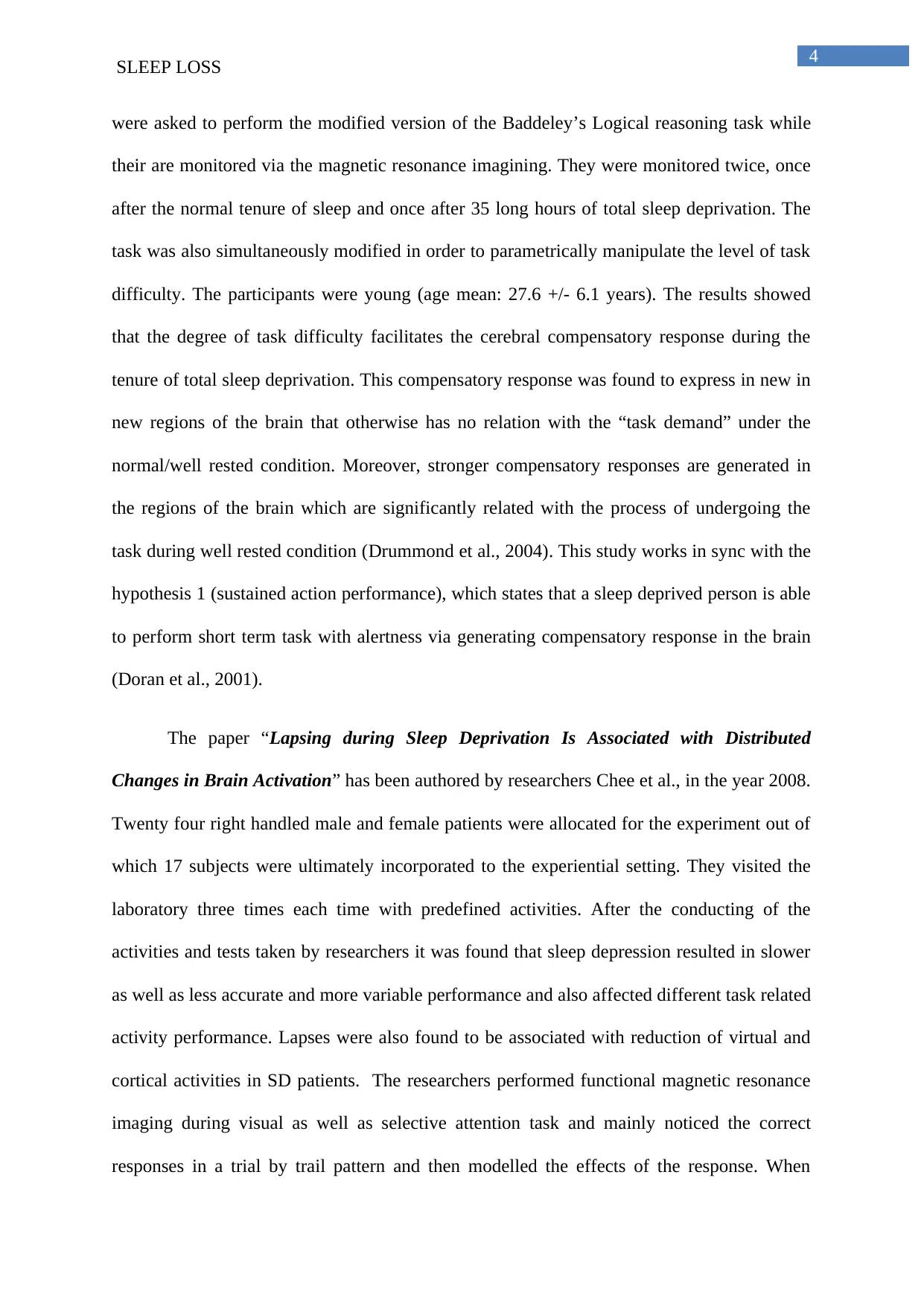
4
SLEEP LOSS
were asked to perform the modified version of the Baddeley’s Logical reasoning task while
their are monitored via the magnetic resonance imagining. They were monitored twice, once
after the normal tenure of sleep and once after 35 long hours of total sleep deprivation. The
task was also simultaneously modified in order to parametrically manipulate the level of task
difficulty. The participants were young (age mean: 27.6 +/- 6.1 years). The results showed
that the degree of task difficulty facilitates the cerebral compensatory response during the
tenure of total sleep deprivation. This compensatory response was found to express in new in
new regions of the brain that otherwise has no relation with the “task demand” under the
normal/well rested condition. Moreover, stronger compensatory responses are generated in
the regions of the brain which are significantly related with the process of undergoing the
task during well rested condition (Drummond et al., 2004). This study works in sync with the
hypothesis 1 (sustained action performance), which states that a sleep deprived person is able
to perform short term task with alertness via generating compensatory response in the brain
(Doran et al., 2001).
The paper “Lapsing during Sleep Deprivation Is Associated with Distributed
Changes in Brain Activation” has been authored by researchers Chee et al., in the year 2008.
Twenty four right handled male and female patients were allocated for the experiment out of
which 17 subjects were ultimately incorporated to the experiential setting. They visited the
laboratory three times each time with predefined activities. After the conducting of the
activities and tests taken by researchers it was found that sleep depression resulted in slower
as well as less accurate and more variable performance and also affected different task related
activity performance. Lapses were also found to be associated with reduction of virtual and
cortical activities in SD patients. The researchers performed functional magnetic resonance
imaging during visual as well as selective attention task and mainly noticed the correct
responses in a trial by trail pattern and then modelled the effects of the response. When
SLEEP LOSS
were asked to perform the modified version of the Baddeley’s Logical reasoning task while
their are monitored via the magnetic resonance imagining. They were monitored twice, once
after the normal tenure of sleep and once after 35 long hours of total sleep deprivation. The
task was also simultaneously modified in order to parametrically manipulate the level of task
difficulty. The participants were young (age mean: 27.6 +/- 6.1 years). The results showed
that the degree of task difficulty facilitates the cerebral compensatory response during the
tenure of total sleep deprivation. This compensatory response was found to express in new in
new regions of the brain that otherwise has no relation with the “task demand” under the
normal/well rested condition. Moreover, stronger compensatory responses are generated in
the regions of the brain which are significantly related with the process of undergoing the
task during well rested condition (Drummond et al., 2004). This study works in sync with the
hypothesis 1 (sustained action performance), which states that a sleep deprived person is able
to perform short term task with alertness via generating compensatory response in the brain
(Doran et al., 2001).
The paper “Lapsing during Sleep Deprivation Is Associated with Distributed
Changes in Brain Activation” has been authored by researchers Chee et al., in the year 2008.
Twenty four right handled male and female patients were allocated for the experiment out of
which 17 subjects were ultimately incorporated to the experiential setting. They visited the
laboratory three times each time with predefined activities. After the conducting of the
activities and tests taken by researchers it was found that sleep depression resulted in slower
as well as less accurate and more variable performance and also affected different task related
activity performance. Lapses were also found to be associated with reduction of virtual and
cortical activities in SD patients. The researchers performed functional magnetic resonance
imaging during visual as well as selective attention task and mainly noticed the correct
responses in a trial by trail pattern and then modelled the effects of the response. When
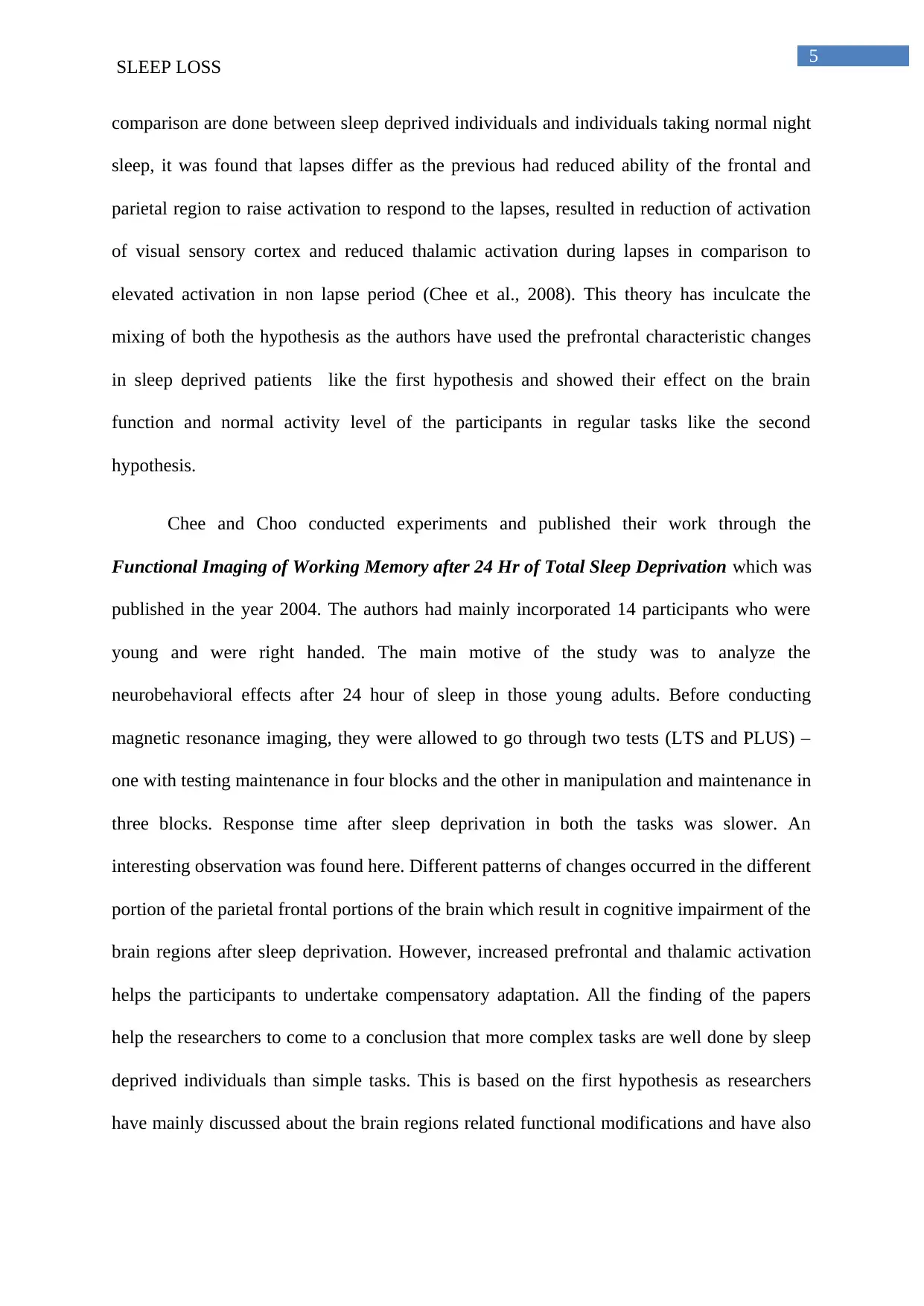
5
SLEEP LOSS
comparison are done between sleep deprived individuals and individuals taking normal night
sleep, it was found that lapses differ as the previous had reduced ability of the frontal and
parietal region to raise activation to respond to the lapses, resulted in reduction of activation
of visual sensory cortex and reduced thalamic activation during lapses in comparison to
elevated activation in non lapse period (Chee et al., 2008). This theory has inculcate the
mixing of both the hypothesis as the authors have used the prefrontal characteristic changes
in sleep deprived patients like the first hypothesis and showed their effect on the brain
function and normal activity level of the participants in regular tasks like the second
hypothesis.
Chee and Choo conducted experiments and published their work through the
Functional Imaging of Working Memory after 24 Hr of Total Sleep Deprivation which was
published in the year 2004. The authors had mainly incorporated 14 participants who were
young and were right handed. The main motive of the study was to analyze the
neurobehavioral effects after 24 hour of sleep in those young adults. Before conducting
magnetic resonance imaging, they were allowed to go through two tests (LTS and PLUS) –
one with testing maintenance in four blocks and the other in manipulation and maintenance in
three blocks. Response time after sleep deprivation in both the tasks was slower. An
interesting observation was found here. Different patterns of changes occurred in the different
portion of the parietal frontal portions of the brain which result in cognitive impairment of the
brain regions after sleep deprivation. However, increased prefrontal and thalamic activation
helps the participants to undertake compensatory adaptation. All the finding of the papers
help the researchers to come to a conclusion that more complex tasks are well done by sleep
deprived individuals than simple tasks. This is based on the first hypothesis as researchers
have mainly discussed about the brain regions related functional modifications and have also
SLEEP LOSS
comparison are done between sleep deprived individuals and individuals taking normal night
sleep, it was found that lapses differ as the previous had reduced ability of the frontal and
parietal region to raise activation to respond to the lapses, resulted in reduction of activation
of visual sensory cortex and reduced thalamic activation during lapses in comparison to
elevated activation in non lapse period (Chee et al., 2008). This theory has inculcate the
mixing of both the hypothesis as the authors have used the prefrontal characteristic changes
in sleep deprived patients like the first hypothesis and showed their effect on the brain
function and normal activity level of the participants in regular tasks like the second
hypothesis.
Chee and Choo conducted experiments and published their work through the
Functional Imaging of Working Memory after 24 Hr of Total Sleep Deprivation which was
published in the year 2004. The authors had mainly incorporated 14 participants who were
young and were right handed. The main motive of the study was to analyze the
neurobehavioral effects after 24 hour of sleep in those young adults. Before conducting
magnetic resonance imaging, they were allowed to go through two tests (LTS and PLUS) –
one with testing maintenance in four blocks and the other in manipulation and maintenance in
three blocks. Response time after sleep deprivation in both the tasks was slower. An
interesting observation was found here. Different patterns of changes occurred in the different
portion of the parietal frontal portions of the brain which result in cognitive impairment of the
brain regions after sleep deprivation. However, increased prefrontal and thalamic activation
helps the participants to undertake compensatory adaptation. All the finding of the papers
help the researchers to come to a conclusion that more complex tasks are well done by sleep
deprived individuals than simple tasks. This is based on the first hypothesis as researchers
have mainly discussed about the brain regions related functional modifications and have also
⊘ This is a preview!⊘
Do you want full access?
Subscribe today to unlock all pages.

Trusted by 1+ million students worldwide
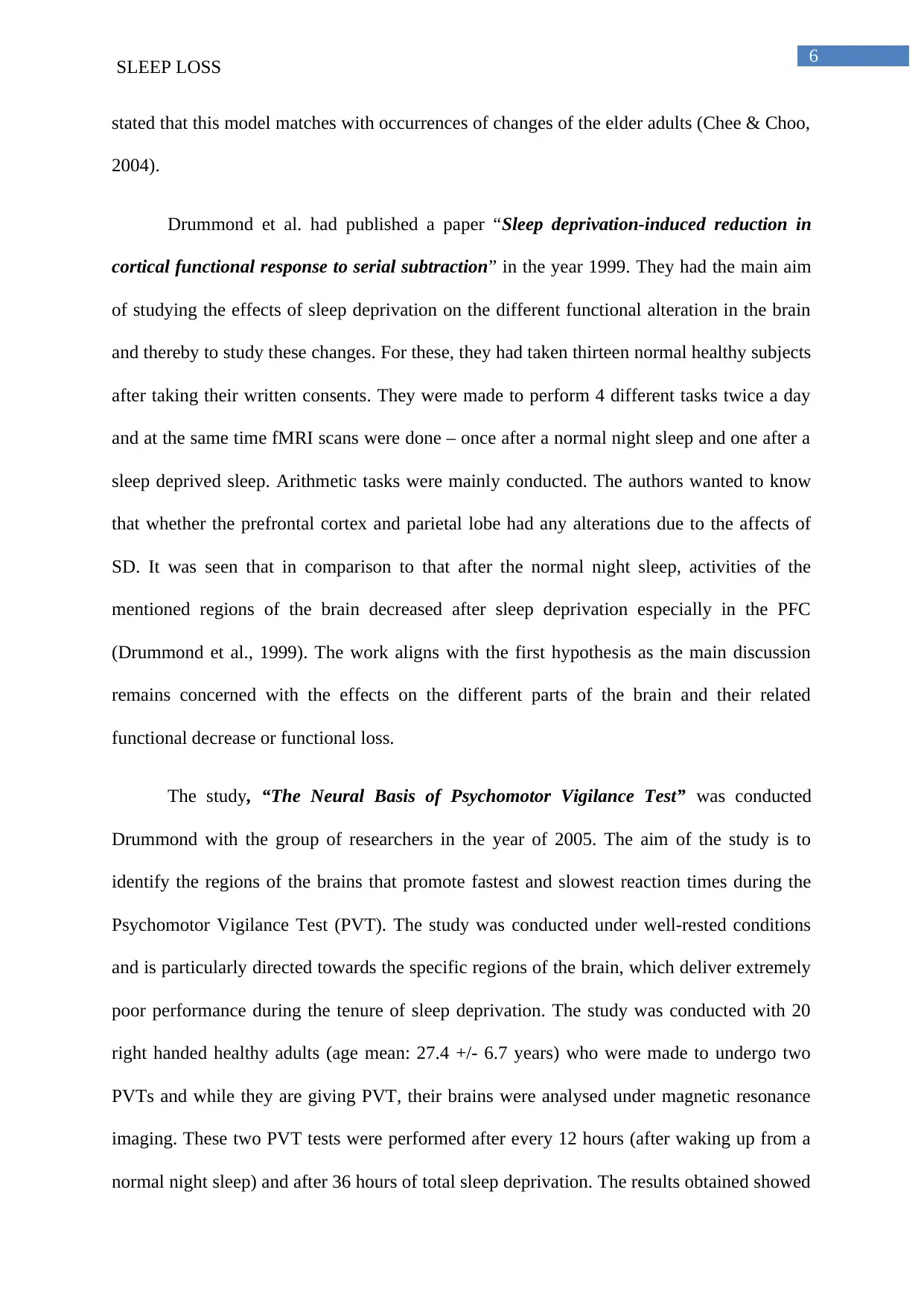
6
SLEEP LOSS
stated that this model matches with occurrences of changes of the elder adults (Chee & Choo,
2004).
Drummond et al. had published a paper “Sleep deprivation-induced reduction in
cortical functional response to serial subtraction” in the year 1999. They had the main aim
of studying the effects of sleep deprivation on the different functional alteration in the brain
and thereby to study these changes. For these, they had taken thirteen normal healthy subjects
after taking their written consents. They were made to perform 4 different tasks twice a day
and at the same time fMRI scans were done – once after a normal night sleep and one after a
sleep deprived sleep. Arithmetic tasks were mainly conducted. The authors wanted to know
that whether the prefrontal cortex and parietal lobe had any alterations due to the affects of
SD. It was seen that in comparison to that after the normal night sleep, activities of the
mentioned regions of the brain decreased after sleep deprivation especially in the PFC
(Drummond et al., 1999). The work aligns with the first hypothesis as the main discussion
remains concerned with the effects on the different parts of the brain and their related
functional decrease or functional loss.
The study, “The Neural Basis of Psychomotor Vigilance Test” was conducted
Drummond with the group of researchers in the year of 2005. The aim of the study is to
identify the regions of the brains that promote fastest and slowest reaction times during the
Psychomotor Vigilance Test (PVT). The study was conducted under well-rested conditions
and is particularly directed towards the specific regions of the brain, which deliver extremely
poor performance during the tenure of sleep deprivation. The study was conducted with 20
right handed healthy adults (age mean: 27.4 +/- 6.7 years) who were made to undergo two
PVTs and while they are giving PVT, their brains were analysed under magnetic resonance
imaging. These two PVT tests were performed after every 12 hours (after waking up from a
normal night sleep) and after 36 hours of total sleep deprivation. The results obtained showed
SLEEP LOSS
stated that this model matches with occurrences of changes of the elder adults (Chee & Choo,
2004).
Drummond et al. had published a paper “Sleep deprivation-induced reduction in
cortical functional response to serial subtraction” in the year 1999. They had the main aim
of studying the effects of sleep deprivation on the different functional alteration in the brain
and thereby to study these changes. For these, they had taken thirteen normal healthy subjects
after taking their written consents. They were made to perform 4 different tasks twice a day
and at the same time fMRI scans were done – once after a normal night sleep and one after a
sleep deprived sleep. Arithmetic tasks were mainly conducted. The authors wanted to know
that whether the prefrontal cortex and parietal lobe had any alterations due to the affects of
SD. It was seen that in comparison to that after the normal night sleep, activities of the
mentioned regions of the brain decreased after sleep deprivation especially in the PFC
(Drummond et al., 1999). The work aligns with the first hypothesis as the main discussion
remains concerned with the effects on the different parts of the brain and their related
functional decrease or functional loss.
The study, “The Neural Basis of Psychomotor Vigilance Test” was conducted
Drummond with the group of researchers in the year of 2005. The aim of the study is to
identify the regions of the brains that promote fastest and slowest reaction times during the
Psychomotor Vigilance Test (PVT). The study was conducted under well-rested conditions
and is particularly directed towards the specific regions of the brain, which deliver extremely
poor performance during the tenure of sleep deprivation. The study was conducted with 20
right handed healthy adults (age mean: 27.4 +/- 6.7 years) who were made to undergo two
PVTs and while they are giving PVT, their brains were analysed under magnetic resonance
imaging. These two PVT tests were performed after every 12 hours (after waking up from a
normal night sleep) and after 36 hours of total sleep deprivation. The results obtained showed
Paraphrase This Document
Need a fresh take? Get an instant paraphrase of this document with our AI Paraphraser
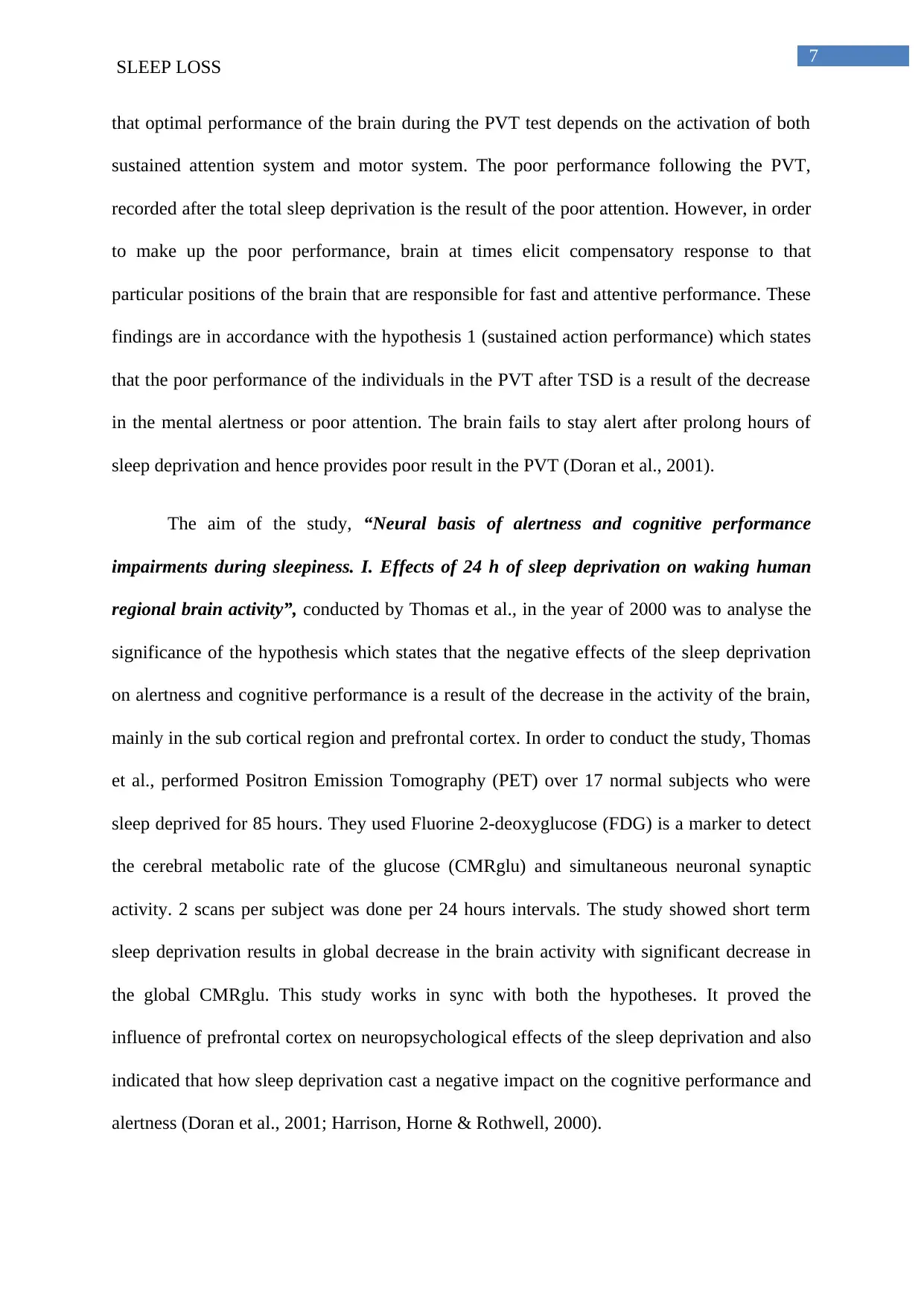
7
SLEEP LOSS
that optimal performance of the brain during the PVT test depends on the activation of both
sustained attention system and motor system. The poor performance following the PVT,
recorded after the total sleep deprivation is the result of the poor attention. However, in order
to make up the poor performance, brain at times elicit compensatory response to that
particular positions of the brain that are responsible for fast and attentive performance. These
findings are in accordance with the hypothesis 1 (sustained action performance) which states
that the poor performance of the individuals in the PVT after TSD is a result of the decrease
in the mental alertness or poor attention. The brain fails to stay alert after prolong hours of
sleep deprivation and hence provides poor result in the PVT (Doran et al., 2001).
The aim of the study, “Neural basis of alertness and cognitive performance
impairments during sleepiness. I. Effects of 24 h of sleep deprivation on waking human
regional brain activity”, conducted by Thomas et al., in the year of 2000 was to analyse the
significance of the hypothesis which states that the negative effects of the sleep deprivation
on alertness and cognitive performance is a result of the decrease in the activity of the brain,
mainly in the sub cortical region and prefrontal cortex. In order to conduct the study, Thomas
et al., performed Positron Emission Tomography (PET) over 17 normal subjects who were
sleep deprived for 85 hours. They used Fluorine 2-deoxyglucose (FDG) is a marker to detect
the cerebral metabolic rate of the glucose (CMRglu) and simultaneous neuronal synaptic
activity. 2 scans per subject was done per 24 hours intervals. The study showed short term
sleep deprivation results in global decrease in the brain activity with significant decrease in
the global CMRglu. This study works in sync with both the hypotheses. It proved the
influence of prefrontal cortex on neuropsychological effects of the sleep deprivation and also
indicated that how sleep deprivation cast a negative impact on the cognitive performance and
alertness (Doran et al., 2001; Harrison, Horne & Rothwell, 2000).
SLEEP LOSS
that optimal performance of the brain during the PVT test depends on the activation of both
sustained attention system and motor system. The poor performance following the PVT,
recorded after the total sleep deprivation is the result of the poor attention. However, in order
to make up the poor performance, brain at times elicit compensatory response to that
particular positions of the brain that are responsible for fast and attentive performance. These
findings are in accordance with the hypothesis 1 (sustained action performance) which states
that the poor performance of the individuals in the PVT after TSD is a result of the decrease
in the mental alertness or poor attention. The brain fails to stay alert after prolong hours of
sleep deprivation and hence provides poor result in the PVT (Doran et al., 2001).
The aim of the study, “Neural basis of alertness and cognitive performance
impairments during sleepiness. I. Effects of 24 h of sleep deprivation on waking human
regional brain activity”, conducted by Thomas et al., in the year of 2000 was to analyse the
significance of the hypothesis which states that the negative effects of the sleep deprivation
on alertness and cognitive performance is a result of the decrease in the activity of the brain,
mainly in the sub cortical region and prefrontal cortex. In order to conduct the study, Thomas
et al., performed Positron Emission Tomography (PET) over 17 normal subjects who were
sleep deprived for 85 hours. They used Fluorine 2-deoxyglucose (FDG) is a marker to detect
the cerebral metabolic rate of the glucose (CMRglu) and simultaneous neuronal synaptic
activity. 2 scans per subject was done per 24 hours intervals. The study showed short term
sleep deprivation results in global decrease in the brain activity with significant decrease in
the global CMRglu. This study works in sync with both the hypotheses. It proved the
influence of prefrontal cortex on neuropsychological effects of the sleep deprivation and also
indicated that how sleep deprivation cast a negative impact on the cognitive performance and
alertness (Doran et al., 2001; Harrison, Horne & Rothwell, 2000).
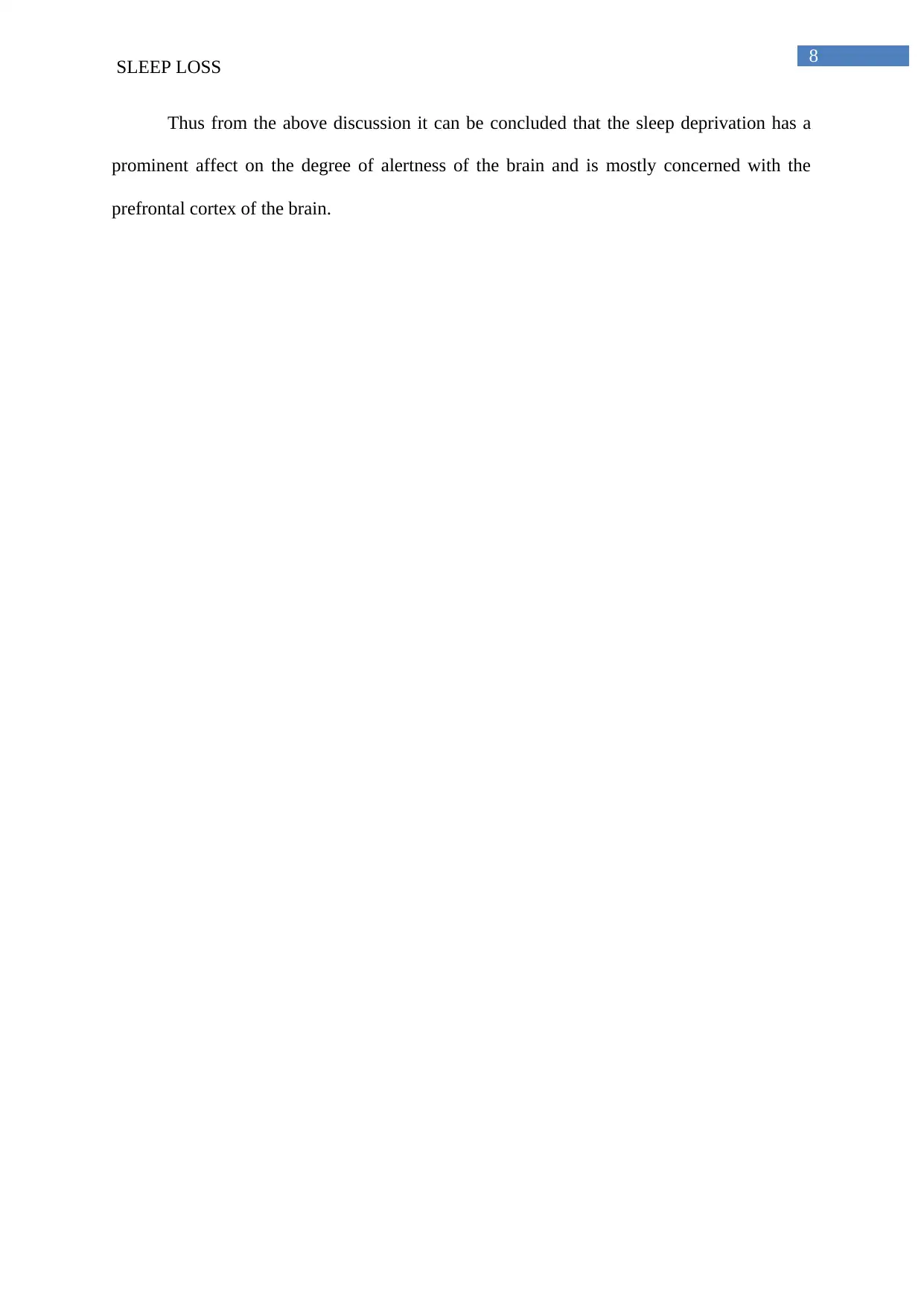
8
SLEEP LOSS
Thus from the above discussion it can be concluded that the sleep deprivation has a
prominent affect on the degree of alertness of the brain and is mostly concerned with the
prefrontal cortex of the brain.
SLEEP LOSS
Thus from the above discussion it can be concluded that the sleep deprivation has a
prominent affect on the degree of alertness of the brain and is mostly concerned with the
prefrontal cortex of the brain.
⊘ This is a preview!⊘
Do you want full access?
Subscribe today to unlock all pages.

Trusted by 1+ million students worldwide
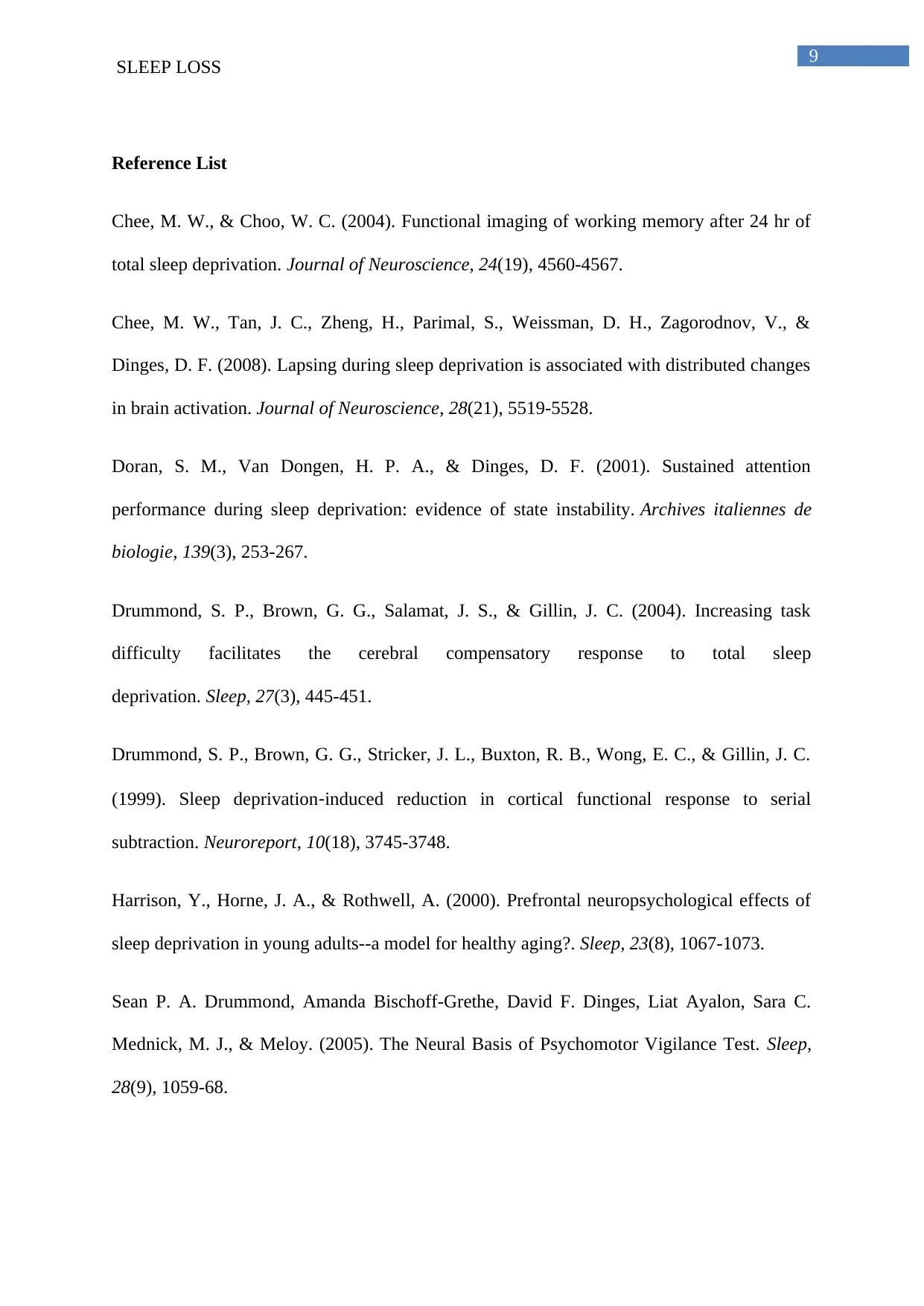
9
SLEEP LOSS
Reference List
Chee, M. W., & Choo, W. C. (2004). Functional imaging of working memory after 24 hr of
total sleep deprivation. Journal of Neuroscience, 24(19), 4560-4567.
Chee, M. W., Tan, J. C., Zheng, H., Parimal, S., Weissman, D. H., Zagorodnov, V., &
Dinges, D. F. (2008). Lapsing during sleep deprivation is associated with distributed changes
in brain activation. Journal of Neuroscience, 28(21), 5519-5528.
Doran, S. M., Van Dongen, H. P. A., & Dinges, D. F. (2001). Sustained attention
performance during sleep deprivation: evidence of state instability. Archives italiennes de
biologie, 139(3), 253-267.
Drummond, S. P., Brown, G. G., Salamat, J. S., & Gillin, J. C. (2004). Increasing task
difficulty facilitates the cerebral compensatory response to total sleep
deprivation. Sleep, 27(3), 445-451.
Drummond, S. P., Brown, G. G., Stricker, J. L., Buxton, R. B., Wong, E. C., & Gillin, J. C.
(1999). Sleep deprivation‐induced reduction in cortical functional response to serial
subtraction. Neuroreport, 10(18), 3745-3748.
Harrison, Y., Horne, J. A., & Rothwell, A. (2000). Prefrontal neuropsychological effects of
sleep deprivation in young adults--a model for healthy aging?. Sleep, 23(8), 1067-1073.
Sean P. A. Drummond, Amanda Bischoff-Grethe, David F. Dinges, Liat Ayalon, Sara C.
Mednick, M. J., & Meloy. (2005). The Neural Basis of Psychomotor Vigilance Test. Sleep,
28(9), 1059-68.
SLEEP LOSS
Reference List
Chee, M. W., & Choo, W. C. (2004). Functional imaging of working memory after 24 hr of
total sleep deprivation. Journal of Neuroscience, 24(19), 4560-4567.
Chee, M. W., Tan, J. C., Zheng, H., Parimal, S., Weissman, D. H., Zagorodnov, V., &
Dinges, D. F. (2008). Lapsing during sleep deprivation is associated with distributed changes
in brain activation. Journal of Neuroscience, 28(21), 5519-5528.
Doran, S. M., Van Dongen, H. P. A., & Dinges, D. F. (2001). Sustained attention
performance during sleep deprivation: evidence of state instability. Archives italiennes de
biologie, 139(3), 253-267.
Drummond, S. P., Brown, G. G., Salamat, J. S., & Gillin, J. C. (2004). Increasing task
difficulty facilitates the cerebral compensatory response to total sleep
deprivation. Sleep, 27(3), 445-451.
Drummond, S. P., Brown, G. G., Stricker, J. L., Buxton, R. B., Wong, E. C., & Gillin, J. C.
(1999). Sleep deprivation‐induced reduction in cortical functional response to serial
subtraction. Neuroreport, 10(18), 3745-3748.
Harrison, Y., Horne, J. A., & Rothwell, A. (2000). Prefrontal neuropsychological effects of
sleep deprivation in young adults--a model for healthy aging?. Sleep, 23(8), 1067-1073.
Sean P. A. Drummond, Amanda Bischoff-Grethe, David F. Dinges, Liat Ayalon, Sara C.
Mednick, M. J., & Meloy. (2005). The Neural Basis of Psychomotor Vigilance Test. Sleep,
28(9), 1059-68.
Paraphrase This Document
Need a fresh take? Get an instant paraphrase of this document with our AI Paraphraser
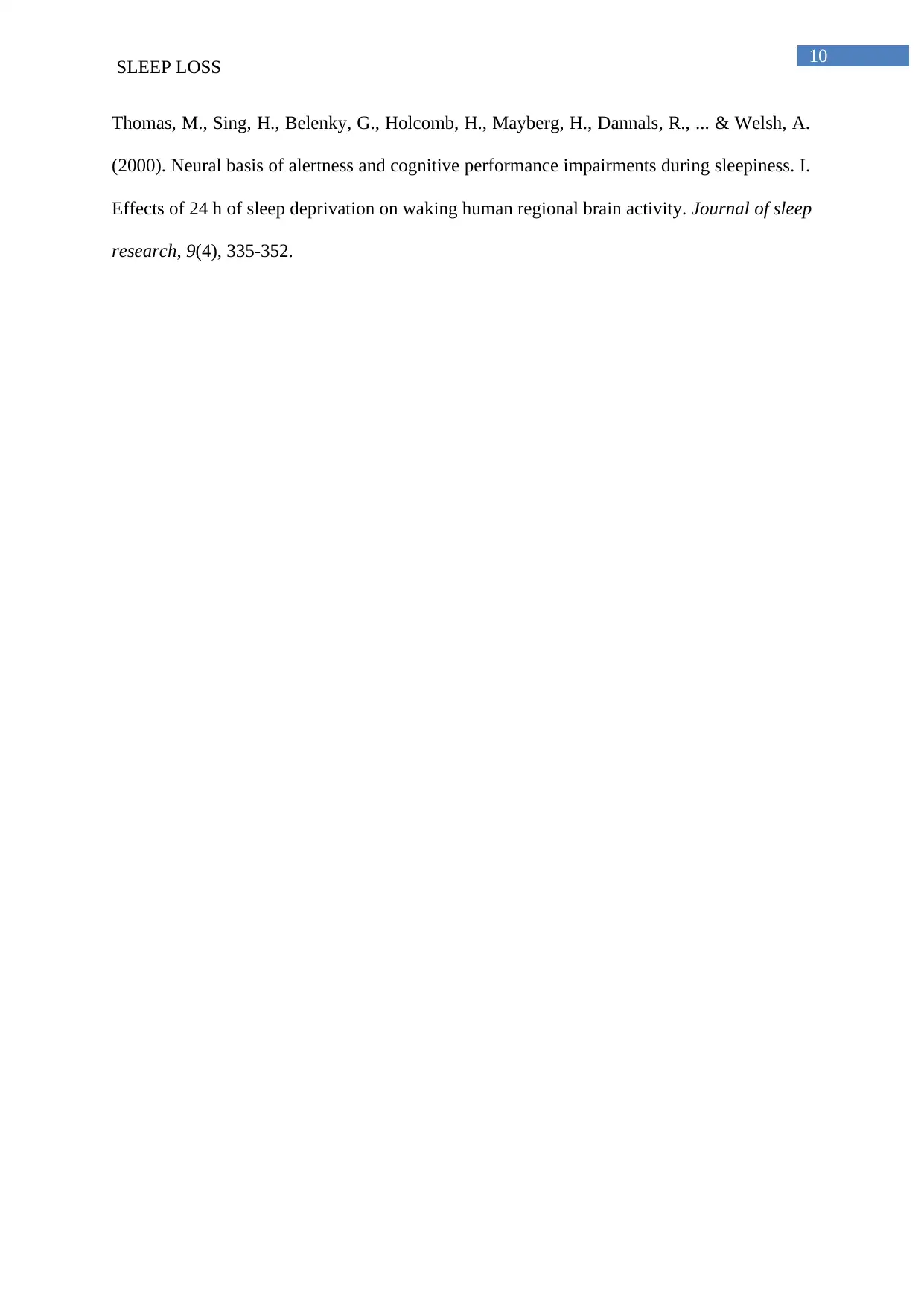
10
SLEEP LOSS
Thomas, M., Sing, H., Belenky, G., Holcomb, H., Mayberg, H., Dannals, R., ... & Welsh, A.
(2000). Neural basis of alertness and cognitive performance impairments during sleepiness. I.
Effects of 24 h of sleep deprivation on waking human regional brain activity. Journal of sleep
research, 9(4), 335-352.
SLEEP LOSS
Thomas, M., Sing, H., Belenky, G., Holcomb, H., Mayberg, H., Dannals, R., ... & Welsh, A.
(2000). Neural basis of alertness and cognitive performance impairments during sleepiness. I.
Effects of 24 h of sleep deprivation on waking human regional brain activity. Journal of sleep
research, 9(4), 335-352.
1 out of 11
Your All-in-One AI-Powered Toolkit for Academic Success.
+13062052269
info@desklib.com
Available 24*7 on WhatsApp / Email
![[object Object]](/_next/static/media/star-bottom.7253800d.svg)
Unlock your academic potential
Copyright © 2020–2026 A2Z Services. All Rights Reserved. Developed and managed by ZUCOL.


